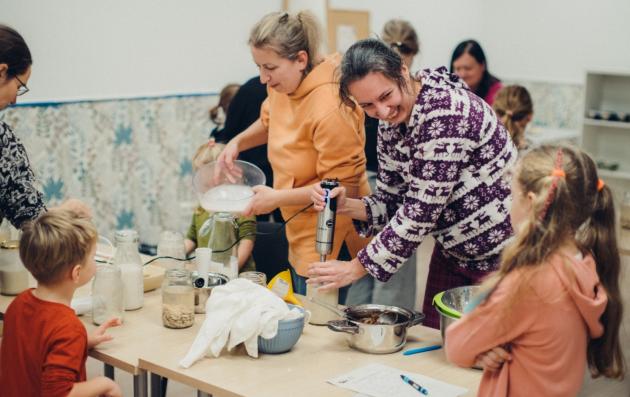Date of label : 29/10/2024
-
Wroclaw , Poland
-
Size of city : 674.312 inhabitants

Adults and children cooking together.
Summary
The goal of the Microgrants programme in Wrocław (PL) is to enable people to acquire and develop the skills necessary to lead grassroots community initiatives. It also encourages the creative exchange of ideas at community level, with an emphasis on social diversity. The programme is designed to support projects that engage residents in an active way and integrate them in joint actions. An important assumption is the decentralisation of activities, with projects conducted outside the city centre. The maximum amount of financial support for a single project is PLN 5 000 (around EUR 1 100), complemented by support for administrative, legal, logistic or promotional activities.
The solutions offered by the Good Practice
Wrocław Institute of Culture runs a city-wide programme supporting local grassroots initiatives, in collaboration with the Umbrella Foundation that leads the part of the programme dedicated to NGOs and youth. Under the programme, residents of Wroclaw can obtain grants to implement their own ideas for community activities.
Launched in 2018, the programme invites individuals or groups to submit a wide variety of ideas annually, including proposals for cultural, recreational, social, educational, and arts-related activities. The most important thing is to involve the residents of Wrocław’s neighbourhoods in joint actions.
As decentralisation is an important factor in Microgrants, events organised outside the centre of Wrocław are encouraged. The programme also fosters a network of connections among various social groups and initiatives that share common goals across Wrocław’s neighbourhoods.
Building on the sustainable and integrated urban approach
Microgrants drives sustainable and inclusive urban development by integrating environmental, economic and social dimensions.
Environmental: The programme promotes eco-friendly practices and environmental awareness in every project. Participants are given an ecological handbook as part of the agreement, and they can borrow reusable objects.
Economic: Unlike many grant schemes, this Microgrants programme does not require a financial contribution, eliminating economical barriers to entry. Moreover, all events organised under the programme are free of charge, making them accessible to the entire community, fostering widespread participation.
Social: Microgrants are deeply committed to social inclusion. Open calls for projects and events are accessible to everyone, regardless of gender, religion, ethnicity, or skill level, so that diverse voices and perspectives are represented, promoting a sense of community. Projects often focus on meeting the needs of marginalised groups, such as elderly people or individuals with disabilities, fostering social cohesion.
This integrated approach sets a precedent for the sustainable, inclusive, and economically-viable urban development that is essential for creating resilient, thriving cities.
Based on participatory approach
The Microgrants programme is based on a participatory model. It supports grassroots initiatives by providing financial, administrative, and logistical assistance. Residents design and implement activities based on what they want, where, and for whom, in a way that actively engages participants as co-creators (e.g. through workshops).
These principles are outlined in the programme regulations, and all projects are documented on a dedicated website. Funded from the city budget, the programme is implemented by the Wrocław Institute of Culture, in collaboration with the Umbrella Foundation that leads the NGO and youth projects.
The network of cooperation has expanded with Community Activity Centres, and the creation of a list of places where residents can rent rooms for workshops free of charge. The practice also aligns with the Wrocław Participatory Budget, with applicants gaining additional points for using infrastructure created under the Budget in their projects.
What difference has it made?
Microgrants supports 40 projects annually, with 342 projects and growing funded since 2014 addressing urban needs and fostering community development.
Notable impacts are:
- The creation of a more balanced cultural offer, with events organised from the city centre to the outermost neighbourhoods, making cultural activities accessible to a wider audience.
- All events are free and focus on skill development, education, eco-awareness, digital technologies, and local history, to create an equitable cultural participation.
- The empowerment of migrants, particularly Ukrainians, through intercultural and integrating projects, often led by migrants themselves, fostering a sense of belonging and community cohesion.
- The programme also empowers women as local leaders of projects.
- Many Microgrants participants new to leadership later thrive leading other grant programmes, NGOs, and socio-cultural activities, indicating the programme’s effectiveness in developing leadership skills.
Overall, Microgrants’ holistic approach has made the programme a cornerstone of Wrocław’s community development strategy, aiming to enhance social capital and civic engagement.
Why this Good Practice should be transferred to other cities
Microgrants aligns with core European values, and is highly relevant for other European cities who want to foster grassroots movements, local leaders, and community engagement. The programme promotes diversity, social cohesion, and collective responsibility, creating a sense of belonging in urban communities. By focusing on skill acquisition it ensures that residents can effectively contribute to their city, nurturing a participatory civic culture.
Encouraging creative dialogue and idea exchange among diverse social groups not only enhances community integration but also cultivates a vibrant and resilient urban environment. Moreover, the programme's focus on decentralising activities to include settlements outside the city centre promotes equitable urban development and accessibility.
Microgrants has a simple and widely-understood framework, which ensures it can be easily transferred to other cities. The programme can be adapted to suit other city contexts.
Key factors for replication:
- Secure funding and establish clear goals.
- Assess local needs to tailor procedures effectively.
- Set a legal framework, determine the programme's scale, and engage local leaders.
- Establish communication channels.
- Develop a management plan to ensure successful implementation.
